As seen in the last post, the family of Abraham Mansbach had prospered despite Abraham’s early death in 1887 at age 52. Unfortunately, his DNA would cast a long shadow on his children and grandchildren.
The last post ended in 1915 when Abraham’s son Jerome married Ida Herzog. At that time Jerome and his sister Mollie and her family were all living in Baltimore. Mollie was married to Herman Kerngood, a successful businessman, the owner and president of a button and metal fastening manufacturing business, Alma Manufacturing. They had two sons, Allen and Morton Kerngood.
The World War I draft registrations for the Mansbach and Kerngood men revealed more details of their lives as of 1917-1918. Jerome Mansbach was living in Baltimore with Ida and working as a traveling salesman for H & S Cohn of New York City. In 1920, Jerome and Ida were living with Ida’s father Charles and her sister and brother-in-law in Baltimore; Jerome continued to work as a traveling salesman.
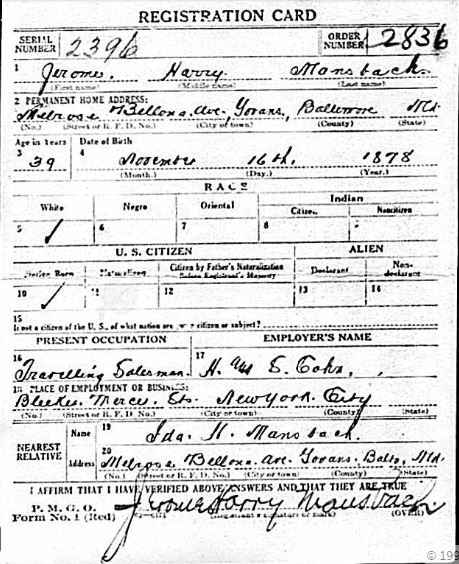
Jerome Mansbach World War I draft registration
Registration State: Maryland; Registration County: Baltimore; Roll: 1684239; Draft Board: 4
Jerome’s nephew Allen Kerngood was living in Baltimore with his wife, Myrtle Folb, and one child (a daughter, Marian, born in 1913), and he was working as a superintendent at his father’s company, Alma Manufacturing.
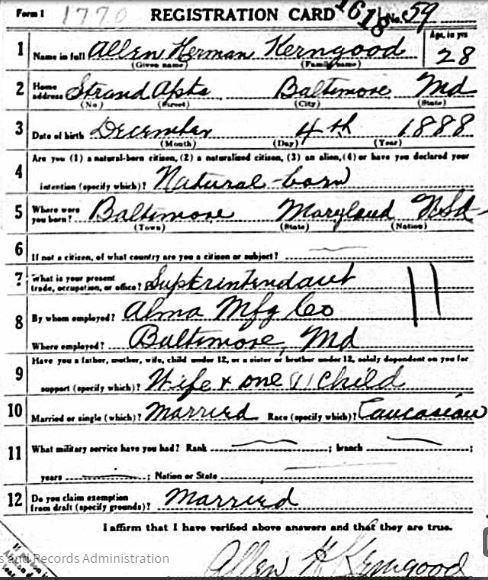
Allen Kerngood World War I draft registration
Registration State: Maryland; Registration County: Baltimore (Independent City); Roll: 1684137; Draft Board: 13
Allen’s younger brother Morton Kerngood was working as an assistant superintendent at Alma Manufacturing and was now married and also living in Baltimore. He was married to Myra Spandour, a Virginia native.
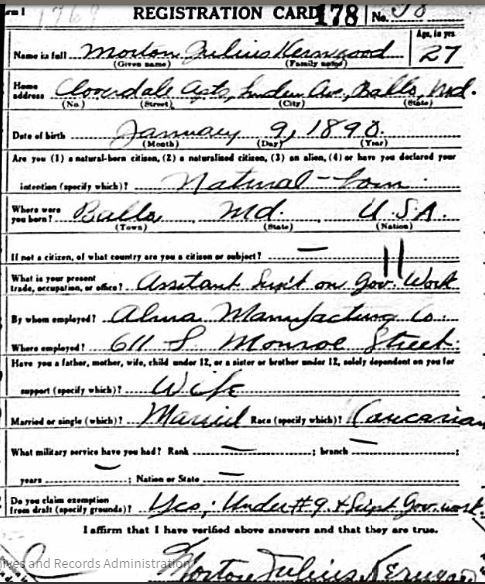
Morton Kerngood World War I draft registration
Registration State: Maryland; Registration County: Baltimore (Independent City); Roll: 1684137; Draft Board: 13
Meanwhile, the family matriarch Eliza (Gump) Mansbach, Abraham’s widow, relocated to Atlantic City by 1920. Eliza is listed as residing at Gerstel’s Hotel in both the 1920 and 1921 Atlantic City directories. Although Eliza still had one brother, Jacob, and her two children and her grandchildren living in Baltimore, something prompted her to move by herself to Atlantic City. Of course, as I’ve written earlier in my posts about the family of Simon Schoenthal, the 1910s were the heyday of Atlantic City’s popularity. But it still strikes me as somewhat surprising that Eliza, a widow in her seventies, would have moved away from her children and grandchildren.
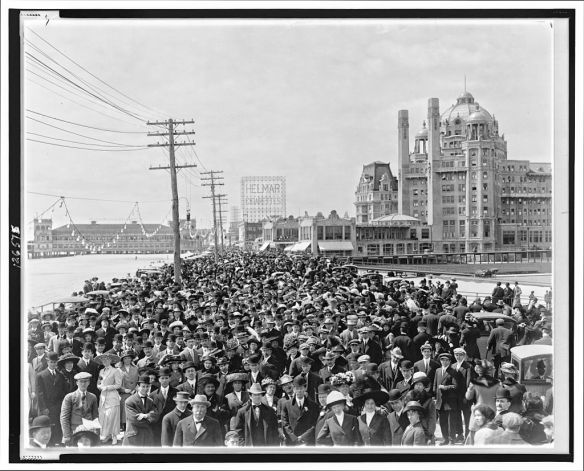
Atlantic City Boardwalk 1911
https://upload.wikimedia.org/wikipedia/commons/b/b7/Atlantic_City_Boardwalk_crowd_in_front_of_Blenheim_hotel_1911_re-retouched.jpg
As for Eliza’s daughter Mollie and her husband, Herman Kerngood, like Eliza, they seem to have eluded the census enumerator in 1920. But other reports indicate that Herman was still the owner and president of Alma Manufacturing. Herman was nominated to serve as a Supervisor for City Charities for the city of Baltimore in June 1921, and after some controversy, was appointed:
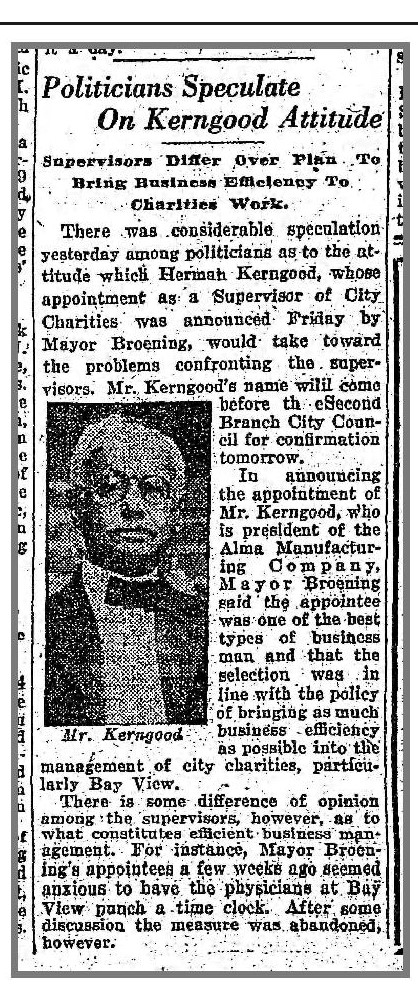
Baltimore Sun, June 18, 1921, p.17
Six years later he was named to the Baltimore Board of Pension Trustees:
I was able to locate Mollie and Herman’s sons on the 1920 census records. Their older son Allen and his wife Myrtle were living in Baltimore with their daughter Marian; Allen continued to work at Alma Manufacturing with his father. Allen and Myrtle would have a second child, Herman (II), in 1922. Allen’s brother Morton was also working at Alma Manufacturing; he and his wife Myra had a child, Morton, Jr., in 1921. They were also living in Baltimore.
Thus, it seemed that the family was thriving and that life was treating them all well in the 1920s. But fortunes started to change in 1929. On September 1 of that year, Eliza Gump Mansbach died at age 86 and was buried with her husband Abraham at Oheb Shalom cemetery in Baltimore; she had outlived him by 42 years.
Her children did not outlive her for as many years. Although her daughter Mollie (Mansbach) Kerngood is listed with her husband Herman in the 1930 Baltimore directory, she is not listed with him on the 1930 census. He is listed as living at the same address as that listed in the 1930 directory, but Mollie is not included.
On March 21, 1931, the Baltimore Sun reported that Herman Kerngood had been hospitalized after suffering a “breakdown.”
Four months later, the newspaper reported that Herman had been “dropped” from the Board of Pension Trustees by the current mayor; the article seemed to suggest that this was for political reasons, as Kerngood was a Republican and the new mayor a Democrat.
Then just a month later, on August 11, 1931, Mollie Kerngood died. She was 64. There was no obituary, just this short death notice, describing her as the “beloved wife” of Herman Kerngood.
I can’t quite put all these pieces together, but the timing of all of these events seems to be too odd to be coincidental. Had Mollie taken ill sometime before April, 1930, when the census was taken? Had Herman’s breakdown been related to his wife’s illness? Had the mayor removed Herman because of this breakdown, not just for political reasons? What would you infer from this series of events? Was it the Depression, not illness, that caused the family’s problems? Some other issue?
The family’s travails did not end there. Herman Kerngood died eleven months after his wife Mollie on July 10, 1932. Despite his prominence as a business leader and public servant in Baltimore, I could not find an obituary for him, only these brief notices of his death and his funeral:
The funeral notice states that he died suddenly of heart trouble. When his estate was probated a month later, it was valued at $209, 393. His sons, Allen and Morton, took over the business of Alma Manufacturing.
On top of these losses, the family suffered what must have been a terrible shock when Allen Kerngood’s wife Myrtle died in June, 1937, in what was reported to have been an accident. Her body was found washed ashore on an island off the coast of Maryland after she had disappeared from a steamer traveling from Norfolk, Virginia, to Baltimore:
Myrtle was only 47, and her children Marian and Herman were 24 and 15, respectively, when she died.
Two years later Allen Kerngood lost his younger brother Morton when he died from a blood infection at age 49:
Morton’s son Morton, Jr. was seventeen when his father died in 1939; he lost his mother, Myra Spandour Kerngood, in 1942, leaving him an orphan at twenty-one years of age.
Thus, the family of Mollie (Mansbach) Kerngood had far more than their fair share of tragedy in the ten years after Mollie died in 1931. First, Herman died in 1932, and then their son Morton died as well as both of their daughters-in-law. The only surviving member of the family aside from the three grandchildren was Allen Kerngood, who died on October 5, 1948, when he was only 59. According to his death notice, he died suddenly.
As for the Kerngood family business, its original facility in Baltimore closed in 1940, and the business was sold to the North and Judd Manufacturing Company of New Britain, Connecticut, in 1946.
Meanwhile, Jerome Mansbach, Mollie’s brother and the son of Abraham and Eliza (Gump) Mansbach, had continued to live with his wife Ida in Baltimore. In 1930, Jerome was still a traveling salesman, but in 1940 when he was 62 he did not list an occupation on the census. His 1942 World War II draft registration confirms that he was no longer employed.
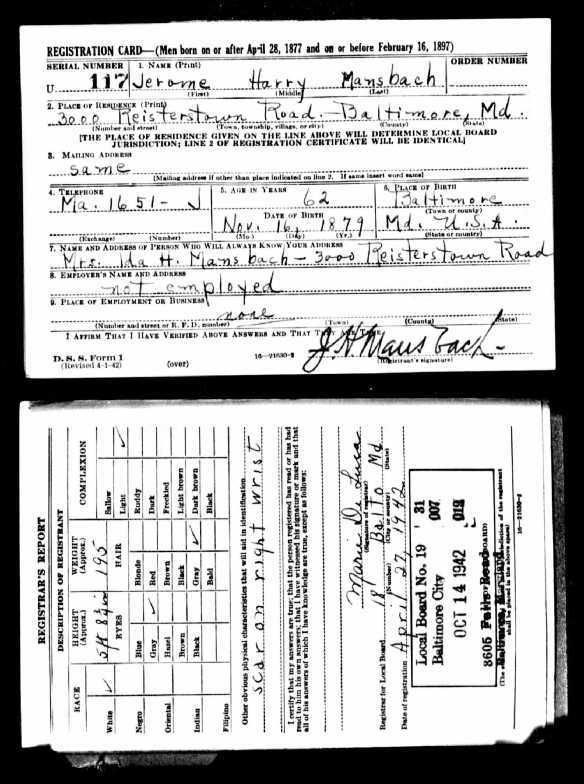
Jerome Mansbach World War II draft registration
The National Archives at St. Louis; St. Louis, Missouri; Draft Registration Cards for Fourth Registration for Maryland, 04/27/1942 – 04/27/1942; NAI Number: 563727; Record Group Title: Records of the Selective Service System; Record Group Number: 147
Jerome died on December 20, 1942; he was 63 or 64 (records conflict as to whether he was born in 1878 or 1879). Like his nephew Morton and his father Abraham, he died suddenly.
His wife Ida died two years later in 1944 when she was 72. Jerome and Ida had not had any children.
Longevity does not appear to have been in the genes of Abraham Mansbach and his children. He died at 52; his daughter Mollie and his son Jerome both died when they were 64, and Mollie’s two sons died at even younger ages: Morton was 49, Allen was 59. Although Eliza Gump Mansbach had lived into her eighties, it appears that neither her children nor her grandsons were as fortunate.



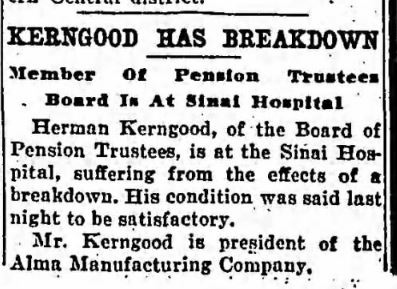

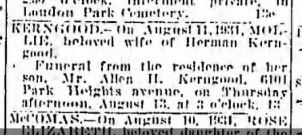
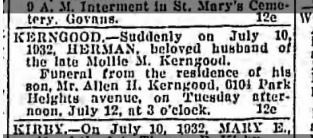
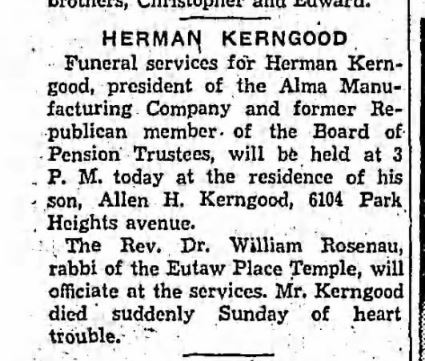

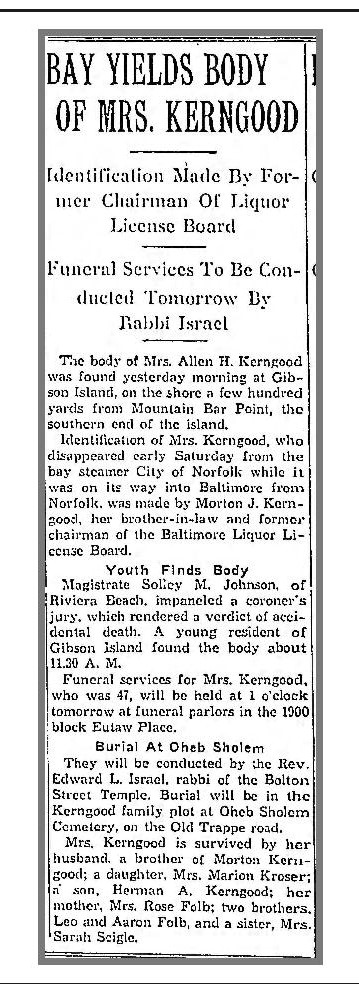
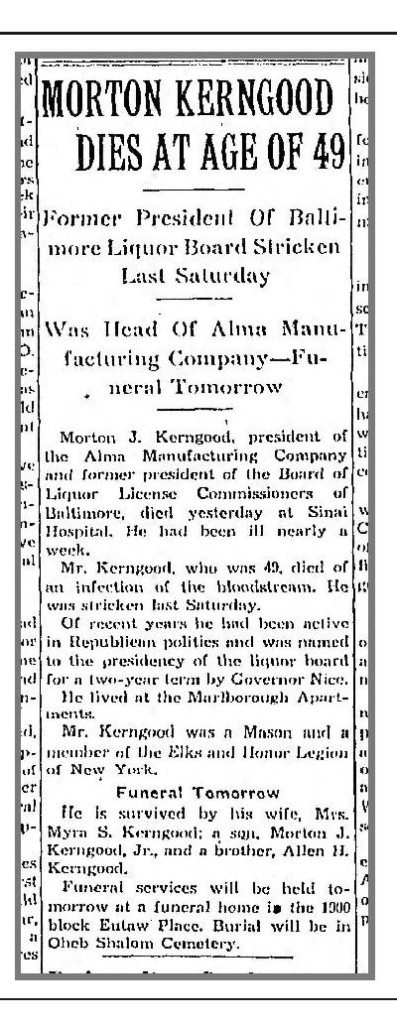
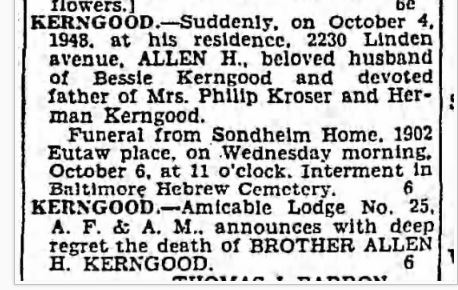
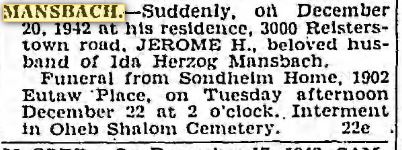
Amy, many sad stories….
Did you look at the ancestors of KERNGOOD? My guess: Kerngut! Also from Hessen!
http://www.hassia-judaica.de/Orte/Rotenburg/Jued_Friedhof/rundgang/16Kerngut.htm
LikeLiked by 1 person
Hi Dorothee, thank you. Actually, Herman was from Warburg (I wrote in my earlier post), so I don’t know if this is the same family. But as always, I appreciate your help. Thanks also for the documents you sent. Herman didn’t immigrate until the 1870s, but perhaps some of those are relatives. 🙂
LikeLike
Hi Amy. This is some story. I only have time for one comment about a detail I find resonates even today. It centers around the opposition Herman Kerngood faced when appointed as Supervisor of City Charities. There seems to have been some tension even then between public service and private corporate management views and techniques. In some quarters today you can hear idle talk about how government workers have it easy because of their unions. Those in private industry think they lack discipline. Here we can see an example of pushback from some of the supervisors who did not want the introduction of a punch time clock which the physicians had to use. (reference your clip from “Baltimore Sun”, June 18, 1921, p. 17.)
I’m not sure if the doctors in question had a regular routine at the Bay View Charity, but if they did, I think I know why. It may have been more a matter of pride since the time clock was associated with factory workers and lower level white collar workers. If this was the case, then Herman had a lot to deal with, including a very touchy group of upper level employees that he would have to adjust his management style to.
Wouldn’t it be something if you could find, in the future, more information on any possible labor problems he encountered?
I think so! I speak from experience having witnessed similar things while working in financial services and then a government owned regulator.
LikeLiked by 1 person
What a great comment, Emily—thank you so much for your insights. I bet you’re right. Of course, today we think business people can run the government. We’ll have to see how that works out….
LikeLiked by 1 person
Oh Amy you had me laughing so much. In a year let’s see how well that trickle down revival plays out. Because that’s what is really up the pike.
LikeLiked by 1 person
Anything that makes anyone laugh is a good thing these days!
LikeLiked by 1 person
I can imagine it would break your heart to learn an entire family did not inherit the luck or good genes of longevity you found in their collateral lines. I have gotten so used to your wonderful family photos and missed them here. Only a tiny image in the newspaper of Herman Kerngood.
LikeLiked by 2 people
Thanks, Cathy. I also wish I had some photos of this branch of the family. I haven’t yet found a living descendant, and as you can see, there weren’t many grandchildren. But maybe some photos will eventually turn up.
LikeLiked by 1 person
You’ve found so many new cousins through Brotmanblog. Wish you luck on this branch.
LikeLiked by 1 person
Thanks, Cathy!
LikeLiked by 1 person
I was struck, too, at how young everyone was when they died after Eliza had lived to be 86. Although when I was 10, someone in their 60’s seemed pretty old to me. I hope you are able to one day find some descendants.
LikeLiked by 2 people
Yes, too bad they didn’t get Eliza’s genes instead. Thank, Debi!
LikeLike
It’s so hard to believe so much tragedy could strike this family. Do you think there might be mystery linked to Mrs Kerngood’s death? I would love to find an accounting of this incident, the search effort, something more. I want to tramp through this Oheb Shalom Cemetery too or take a peek into Synagogue records…..
LikeLiked by 1 person
I know–it’s frustrating that there aren’t more news articles about that incident, or something explaining what was really going on with Herman Kerngood. I find it very hard to understand why there’s no obituary for him. Are you in Baltimore?
LikeLike
Pingback: The Gumps and the Business of Alcohol | Brotmanblog: A Family Journey
It certainly seems that something fairly dramatic happened to Herman and his family, and I take up the point made here about the conflict between public servants and business people, something I have experienced at first hand. Yes, the same paranoia persists today, and for largely the same reasons. It would have provided a framework within which, if the depression struck at Herman’s business interests in any way, he was vulnerable to attack. It sounds to me as if the Board of Pension Trustees contained some fermenting apples.
LikeLiked by 1 person
It is odd that the papers didn’t cover the rest of the story. But then perhaps back then they were slightly more respectful of privacy interests. Have a great Christmas, Frederick!
LikeLiked by 1 person
You too, Amy!
LikeLiked by 1 person
Pingback: My Crazy Twisted Tree and My Hessian Cousins | Brotmanblog: A Family Journey
Pingback: My Kentucky Cousins | Brotmanblog: A Family Journey
Pingback: Another Mikveh, A Castle, A Museum, and A Search for Stones: Trendelburg, Hofgeismar, and Gudensburg | Brotmanblog: A Family Journey
Pingback: Yet Another Abraham Mansbach: More Twists in the Tree | Brotmanblog: A Family Journey